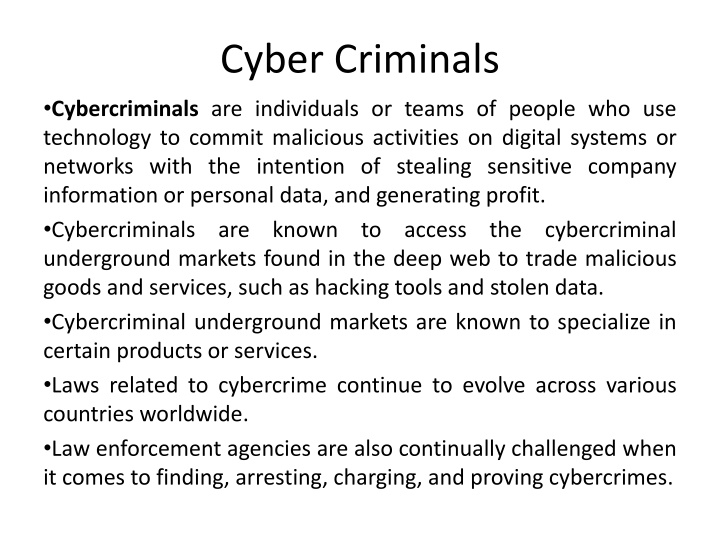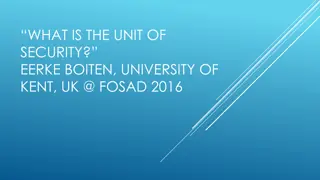
Different Types of Cyber Criminals and Their Tactics
Learn about cyber criminals, including identity thieves, internet stalkers, and phishing scammers, who engage in malicious activities to steal sensitive information. Discover how these criminals operate and the risks they pose to individuals and businesses.
Download Presentation

Please find below an Image/Link to download the presentation.
The content on the website is provided AS IS for your information and personal use only. It may not be sold, licensed, or shared on other websites without obtaining consent from the author. If you encounter any issues during the download, it is possible that the publisher has removed the file from their server.
You are allowed to download the files provided on this website for personal or commercial use, subject to the condition that they are used lawfully. All files are the property of their respective owners.
The content on the website is provided AS IS for your information and personal use only. It may not be sold, licensed, or shared on other websites without obtaining consent from the author.
E N D
Presentation Transcript
Cyber Criminals Cybercriminals are individuals or teams of people who use technology to commit malicious activities on digital systems or networks with the intention of stealing sensitive company information or personal data, and generating profit. Cybercriminals are known underground markets found in the deep web to trade malicious goods and services, such as hacking tools and stolen data. Cybercriminal underground markets are known to specialize in certain products or services. Laws related to cybercrime continue to evolve across various countries worldwide. Law enforcement agencies are also continually challenged when it comes to finding, arresting, charging, and proving cybercrimes. to access the cybercriminal
Common Types of Cyber Criminals Cyber criminals, also known as hackers, often use computer systems to gain access to business trade secrets information for malicious purposes. 1. Identity Thieves Identity thieves are cyber criminals who try to gain access to their information name, address, phone number, place of employment, bank account, credit card information and social security number. and and personal exploitive victims personal
This expansion of strategy has resulted in major losses for companies and consumers, with recent studies approximately $112 billion has been stolen by identity thieves over the past six years. indicating that
Internet Stalkers Internet stalkers are individuals who maliciously monitor the online activity of their victims to terrorize and/or acquire personal information. This form of cyber crime is conducted through the use of social networking platforms and malware, which are able to track an individual s computer activity with very little detection. The motives for such attacks can differ depending on the cyber criminal, but many internet stalkers seek to acquire important information that they can use for bribery, slander, or both. Businesses should be aware of internet stalkers, as well as the strategies that they utilize, in case their employees are ever victims of this cyber attack. If left unaddressed, internet stalkers could cause emotional distress to the team or even obtain data for blackmail.
Phishing Scammers Phishers are cyber criminals who attempt to get ahold of personal or sensitive information through victims computers. This is often done via phishing websites that are designed to copycat small-business, corporate or government websites. Unsuspecting computer users often fall prey to such activities by unknowingly providing personal information including home addresses, social security numbers, and even bank passwords. Once such information is obtained, phishers either use the information themselves for identity fraud scams or sell it in the dark web. It s important for businesses to constantly be aware of phishing scams, particularly scams that may be trying to copycat their own business site. Such sites can tarnish the company s reputation and brand, which could potentially lead to a decrease in earnings.
Cyber Terrorists Cyber terrorism is a well-developed, politically inspired cyber attack in which the cyber criminal attempts to steal data and/or corrupt corporate or government computer systems and networks, resulting in harm to countries, businesses, organizations, and even individuals. The key difference cyberterrorism and a regular cyber attack is that within an act of cyber terrorism, hackers are politically motivated, as opposed to just seeking financial gain. between an act of
Cyber Law Cyber Law is also known as a cybercrime law that deals with the internet and cyberspace crime which is a part of the overall law system. Cyber Law is basically a broader term that provides freedom of expression, access to and usage of the Internet, and online privacy to the users. In general, we can call cyberlaw the Law of the Internet . While talking about its history, the first cyber law act was named the Computer Fraud and Abuse Act which was passed in 1986.
Role of Cyber Law The most important role of cyberlaw is that it helps in defining or representing the rules of cyber society. It also helps to enter into legally enforceable digital contracts which helps to maintain cyber properties. Moreover, it helps recognization of electronic records such as electronic documents and digital signatures. in providing legal
Applications of Cyber Law There are basically two types of applications of cyberlaw which are listed below: Digital Transaction Activities on the Internet
Digital Transaction Digital transactions are those online transactions that take place between participants. In these types of transactions, cash doesn t require. For example, if you signed a contract online rather than in a printed paper, or you make a payment through your debit or credit card, then we can call it a digital transaction. In both cases, by going digital, makes the transaction faster, convenient, and easier. So, any fraud in digital transition is held in the cyber law. two or more
Activities on the Internet We do a lot of activities on the internet like shopping online, sharing, social networking, finance, online gaming and entertainment, buying or making a reservation for travel and email, etc. downloading, file and banking
Advantages of Cyber Laws These are some advantages of cyberlaw which are listed below: Secured E-commerce for Setting Online Business Digital Certificate for securing the site Blocking unwanted content from the Internet Proper monitoring of traffic Security Against common frauds Born of new Security Agencies like Cyber Cell Software as well as Hardware security Proficient use of E-Forms as prescribed Emails are a legal form of communication and it is approved in a court of law.
Disadvantages of Cyber Law Internet-based aren t yet covered by this cyber regulation. Fake IDs and leads cannot be tracked by online media outlets at this time. video-streaming services
Who conducts cybercrime investigations? 1. Criminal justice agencies Criminal justice agencies are the operations behind cybercrime prevention campaigns and the investigation, monitoring and prosecution of digital criminals. Depending on your country of residence, a criminal justice agency will handle all cases related to cybercrime. For example, in the U.S. and depending on the case, a cybercrime can be investigated by the FBI, U.S. Secret Service, Internet Crime Complaint Center, U.S. Postal Inspection Service or the Federal Trade Commission.
2. National security agencies This also changes from one country to another, but in general, this type of agency cybercrime directly related to the agency. For example, an intelligence agency should be in charge of investigating cybercrimes that have some connection to their organization, such employees or data; or intelligence actors. usually investigates as have against been its performed networks, by
3. Private security agencies Private security agencies are also important in the fight against cybercrime, especially during the investigation process. While governments and national agencies run their own networks, servers and applications, they make up only a small fraction of the immense infrastructure and code kept running by private companies, projects, organizations and individuals around the world.
Law Enforcement and Investigation Agencies of India India has several law enforcement agencies at the national, state, and local levels, each with specific responsibilities for maintaining investigating crimes, and upholding the rule of law. Cyber Crime Cells (at State and District Levels): Most states in India have established cyber crime cells within their police departments to handle cybercrimes and related investigations at the state and district levels. These cells are responsible for addressing various cyber offenses and conducting examinations. law and order, digital forensics
Cyber Crime Investigation Cell (CCIC) - Delhi: The Delhi Police has a dedicated Cyber Crime Investigation Cell (CCIC) investigating cybercrimes within the National Capital Territory of Delhi. CCIC is equipped with specialized personnel and resources to handle cybercrime cases. Central Bureau of Investigation (CBI): The CBI is India's premier investigating agency and handles complex and high-profile cybercrimes with national and international implications. It often investigates cases related to financial fraud, corruption, and major cyber incidents. that focuses on cases, including
National Investigation Agency (NIA): NIA is responsible for investigating and prosecuting terrorism-related cases and offenses that have a cross-border or national security dimension. It may also handle cybercrimes that are linked to terrorism or national security concerns. National Cyber Crime Reporting Portal (Cyber Crime Portal): While not a traditional law enforcement agency, the Cyber Crime Portal is an online platform established by the Ministry of Home Affairs where cybercrimes. The portal facilitates coordination between law enforcement addressing reported incidents. citizens can report agencies for
Rapid Action Force (RAF) and Central Reserve Police Force (CRPF): These occasionally involved in maintaining law and order during times of unrest or crisis, including instances when cybercrimes may be linked to civil disturbances. State Police Departments: Each state has its own police department responsible for maintaining law and order within its jurisdiction. These departments often have specialized cyber crime cells or units to address cybercrimes at the state level. National Technical Research Organisation (NTRO): While not a law enforcement agency, NTRO is responsible for technical intelligence and cybersecurity monitoring. It assists law enforcement agencies by providing technical support in certain cybercrime investigations. paramilitary forces are






















